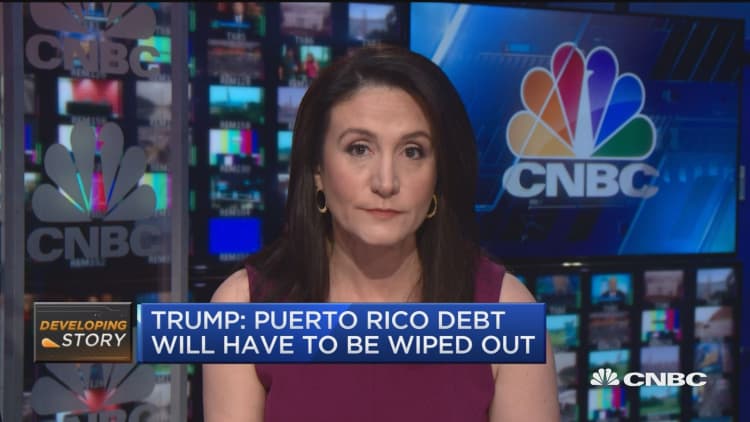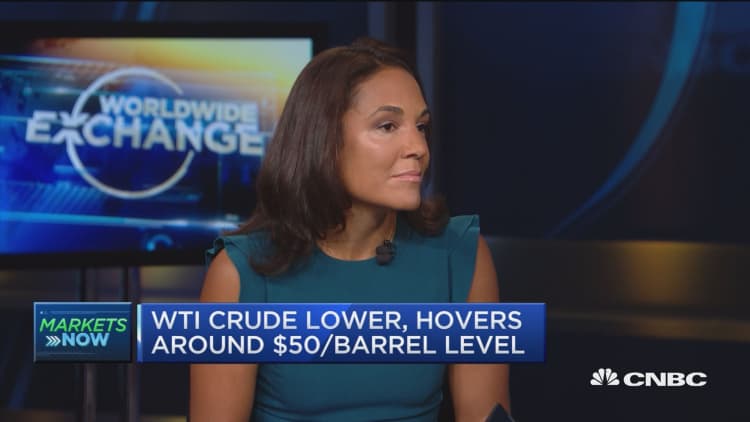RBC Capital Markets' Helima Croft warns that Russian President Vladimir Putin appears to be hewing to the motto of the notorious schemer in HBO's "Game of Thrones": "Chaos is a ladder."
The philosophy sums up the strategy of Petyr "Littlefinger" Baelish, who consolidates his influence by stirring chaos in the fictional continent Westeros. Putin is similarly advancing his interests in the oil market by putting Russia in the thick of geopolitical tension gripping several oil-producing nations, the widely followed oil analyst from RBC said in a recent research note.
"Russia looks set to capitalize on this chaos, having emerged as the preferred partner of stressed petro-states. Moscow may yet close out 2017 as the preeminent energy super power," Croft, the firm's global head of commodity strategy, and her colleagues concluded.
The analyst said Russia is playing a role in crises in Venezuela, Iran and Iraq, all of which could come to a head as soon as this month.
Russia is keeping Venezuela on life support
In Venezuela, beleaguered President Nicolas Maduro may turn to Russia in order to avoid defaulting on $3.5 billion of state oil giant Petroleos de Venezuela SA's debt coming due in October and November, RBC said. The country has spiraled into economic and political crisis after the 2014 oil price crash and years of mismanagement in its energy sector, which underwrites the national budget.

Russia and its own energy titan Rosneft have already provided more than $10 billion in loans, crude oil prepayments and other financial assistance to Venezuela, RBC notes. For its part, Rosneft now has big stakes in five Venezuelan oil fields and designs on nine more. It also picked up ownership of nearly half of PDVSA's U.S.-based refiner Citgo as collateral for $1.5 billion in loans — an arrangement that has vexed American lawmakers.
On Wednesday, Maduro told an audience at Russian Energy Week that Venezuela's debt owed to Russia may need to be restructured.
The threat of increased U.S. sanctions, perhaps aimed at PDVSA, could be the trigger that puts Venezuela more securely under Moscow's thumb, RBC warns. However, analysts note that "the financial cost of carrying Venezuela will likely climb, especially if the U.S. opts to impose even more onerous economic sanctions."
Last man standing in Iran?
President Donald Trump's threats to scrap a historic nuclear deal with Iran could also put Russia in an advantageous position, according to RBC. Trump has suggested that he will refuse to certify this month that Iran is complying with limits on its nuclear program, giving Congress the opportunity to reimpose penalties.
Restoring sanctions without just cause threatens to tear open a rift between the United States and the five world powers that negotiated the deal, including Germany, the U.K. and France. Driving a wedge between NATO allies would be a coup in itself for Russia, but Rosneft is one of the firms lining up to develop Iran's massive oil and gas fields.

While Europe is unlikely to support renewed U.S. sanctions, analysts widely expect the penalties to dissuade at least some European and Asian energy firms from doing business with Iran. RBC says that could clear a path for Rosneft to thrive in several large tenders.
In a sign that Trump continues to face resistance from within his Cabinet, Defense Secretary James Mattis on Tuesday said it is not in the country's national security interest to abandon the Iran nuclear deal.
Potential player in Iraqi Kurdistan
Russia has also been expanding its influence in Iraqi Kurdistan. The semiautonomous northern region of Iraq enraged the central government in Baghdad and neighbors Iran and Turkey by holding an independence vote last week. Since the referendum, tensions have steadily escalated, with Baghdad ratcheting up sanctions after the Kurds scheduled elections for Nov. 1 on Tuesday.
Turkey, which fears unrest among its own Kurdish population, has threatened to shut down a major pipeline from Kurdistan to its shores. RBC says Russia's growing role in Kurdistan's energy industry could give Turkish President Recep Tayyip Erdogan pause.
"Rosneft has become the largest buyer of Kurdish crude, has signed preliminary deals for production sharing contracts for five oil blocks and has agreed to finance the expansion of the ITP pipeline," RBC notes.
"Therefore, if Erdogan made good on his threat to turn off the taps, he could find himself not only squaring off with Kurdish President Masoud Barzani but also against Russian President Vladimir Putin," RBC said.


